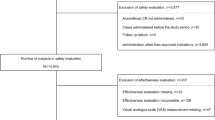Abstract
Design
A randomised controlled trial.
Intervention
A topical application of 0.2% hyaluronic acid (HA) gel or placebo was initially applied by a clinician to the ulcerated area. Patients were instructed how to apply gel for subsequent applications.
Outcome measure
Patients recorded discomfort from the ulcerated area on a 100-mm visual analogue scale (VAS). The boundaries of the scale were marked “no soreness” and “worst possible soreness”. Recordings were made at baseline (before gel application) and at 5, 10, 15, 20, 30, 45, 60, 120, 180 and 240 min after dosing. The first 60 min of the recording were supervised and the remaining observations were carried out in a log diary. Discomfort recordings were made 1 h after application (after breakfast and after the evening meal and at one other time if desired) for 7 days. Patients were also asked to record number of ulcers present in their mouth and the occurrence of any new ulcers during the treatment period.
Results
Both topical HA and placebo resulted in a significant reduction in ulcer soreness following immediate application (P 0.0004). Throughout the rest of the investigation period, there were no significant differences (P>0.05) between the treatments at reducing soreness. Patients using topical HA recorded fewer ulcers on day 5 of the investigation than those in the placebo group (P<0.001). Likewise, the occurrence of new ulcers was lower in the HA-treated group on day 4 compared with placebo (P 0.047).
Conclusions
Topical application of 0.2% HA does appear to be of benefit in the management of recurrent aphthous ulceration (RAS). Immediate application reduces discomfort but this is purely a barrier or protective mechanism from stimuli arising in the oral environment.
Similar content being viewed by others
Commentary
This study utilised a robust protocol commonly employed in contemporary investigations of the management of RAS. Topical HA caused an immediate but transient fall in painful symptoms of RAS, although twice or thrice daily application of HA led to some reduction the development of new ulcers (statistically significant at day 4 of application) and a significant reduction in the number of ulcers at day 5 of therapy. The HA treatment did not give rise to frequent or clinically worrisome adverse side effects. Despite these perhaps promising results, patients had no preference between the active and placebo preparations.
The present results largely mirror those of investigations using other agents of potential benefit in the treatment of RAS.1, 2 Most of the advocated topical agents cause some relief of ulcer-associated pain but have inconsistent effects upon the healing of existing ulcers and development of new ones. Thalidomide is the only agent to date that has been demonstrated to cause a cessation of the ulceration of RAS, but the adverse-side effects of this agent (eg, risk of teratogenicity and peripheral neuropathy) outweigh its use for what must be considered a minor health problem.3
A major hindrance in the treatment of RAS is the lack of understanding of the underlying trigger of the ulceration. The results of the present study do not provide any insight into the aetiopathogenesis of RAS because the benefits of HA therapy were principally transient and its precise benefits of over simple, already-available agents (eg, the corticosteroid triamcinolone in carbomellose paste) remain to be determined. Until there is greater understanding of the relevant aetiology, however, topical agents such as HA that can give some symptomatic relief (and do not cause harm) could be employed for the treatment of RAS. In addition, unless an agent is likely to cause cessation of the ulceration of RAS (an unlikely event for any topical agent) it may be more clinically relevant to simply monitor the effects of new therapies upon painful symptoms and oral function, rather than signs of ulceration.
Practice point
The benefits of HA therapy were principally transient and the precise benefits of HA over simple, already available agents remain to be determined
References
Scully C . Clinical practice. Aphthous ulceration. N Engl J Med 2006; 355:165–172.
Porter SR, Scully C . Aphthous ulcers (recurrent). Clin Evid 2005; 13:1687–1694.
Jurge S, Kuffer R, Scully C, Porter SR . Mucosal disease series. Number VI. Recurrent aphthous stomatitis. Oral Dis 2006; 12:1–21.
Author information
Authors and Affiliations
Additional information
Address for correspondence: Dr Anita Nolan, Oral Medicine, Dundee Dental Hospital and School, Park Place, Dundee DD1 4HR, Scotland, UK. E-mail: anita.nolan@dundee.ac.uk
Nolan A, Baillie C, Badminton J, Rudralingham M, Seymour RA. The efficacy of topical hyaluronic acid in the management of recurrent aphthous ulceration. J Oral Pathol Med 2006; 35:461–465
Rights and permissions
About this article
Cite this article
Porter, S. Transient benefits for topical hyaluronic acid in recurrent aphthous ulceration. Evid Based Dent 8, 52 (2007). https://doi.org/10.1038/sj.ebd.6400498
Published:
Issue Date:
DOI: https://doi.org/10.1038/sj.ebd.6400498



